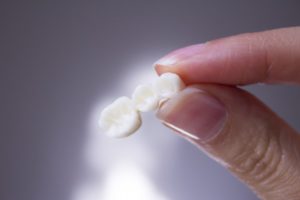
A few years ago, you lost a permanent tooth and decided to replace it with a dental bridge. It looks natural and has served you well—until you chew on a hard candied nut, and it comes out completely!
While this situation can be unnerving, you should understand why this can happen and have a clear idea of what to do next. Keep reading to learn more about how to handle if your bridge fell out.
Why Did Your Bridge Fall Out?
A bridge may come out of place for several reasons. Primarily, the teeth the bridge is attached to (called the abutment teeth) could have decay. While the restoration itself cannot get a cavity, your underlying teeth can. If you are not properly maintaining your smile through regular brushing and flossing, bacteria can degrade the tooth underneath and weaken the bond with the bridge.
Another common cause of bridge failure is that the abutment teeth are too weak to stabilize the restoration for the long term. With tooth loss, the jawbone loses density and strength, which can affect the teeth around the missing one. Also, whether you experience an injury or the normal wear and tear on these teeth, bridges are not indestructible and could become damaged over time.
What to Do If Your Bridge Falls Out
Unless you have serious injuries, such as broken bones, your first move after your bridge comes out should be calling your emergency dentist for an appointment. In the meantime, rinse your mouth and the bridge with water, and gently place the bridge back onto the teeth—if it isn’t too damaged. You may take over-the-counter pain reliever if your abutment teeth hurt.
What Not to Do If Your Bridge Falls Out
In this situation, you should not go to the emergency room. The doctors there are not trained or equipped to deal with dental issues, so you still will need to see a dentist for help. Do not apply superglue or any other adhesive to keep the bridge in position, and if you need to eat, avoid that area of your mouth.
Preventing Bridge Failure
Although you can’t prevent every possible bad thing that could affect your bridge, there are ways to significantly lower your risk of having a bridge fall out. For instance, when you go in for you routine checkup and cleaning with your dentist, they examine your restorations to make sure they are in working condition. If they notice any damage, potential weak spots, or cavities, they can address it before failure. Brushing and flossing every day at home is also essential for keeping bridges in good shape.
In the end, even though your dental bridge came out, your dentist can fix the problem by either reattaching the bridge or replacing it. Either way, soon you can get back to normal function and a full smile!
About the Practice
At Williamsburg Dental, we customize care to each individual patient. For tooth loss, we offer three options to replace missing teeth: bridges, implants, and dentures. Depending on many factors, we can guide you to the right choice for your smile, and we welcome patients who have urgent dental emergencies. To schedule an appointment at one of our six locations in Lincoln, contact us online or call your closest office.
